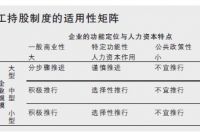
1. The four scenarios of DPRK’s situation
For the past 10 years, the researchers at ANBOUND think tank have been convinced that DPRK is a trouble maker for China. To have a better picture of the future situation of DPRK, allow us to first hypothesize two possible situations for the North Korean regime. The first is that the current leaders to continue reigning, while the second is that they lose the power they now hold. By extrapolating the trends from these two hypotheses, we came up with a total of four scenarios.
The first scenario is that the current leaders of the DPRK government will change their minds and policies where they start focusing on their internal economic development. China sees this as the best-case scenario and has been vigorously pursuing it as it will complement China’s geopolitical interest. Even though the current situation is still far from this ideal scenario, it is definitely worth the continuation of efforts. The second scenario has the highest possibility, which is for the current DPRK leaders to continue adhering to their existing policy. This second scenario is not favourable for China as the geographical hazards for China will remain. The third scenario will be for the current DPRK leaders to lose their power and control abruptly. This scenario might seem favourable to China, but in fact it is the opposite. The reason is because such a scenario is ridden with uncertainties. In this scenario, it is not possible to rule out the possibility of the new successor leading the reunification of the whole of Korea, which will create issues for China. The final scenario depends on the extent of cooperation between China, South Korea, and the United states in handling external strikes. A chaotic DPRK that has lost its direction is not going to benefit China in any way.
From my perspective, China needs to be prepared to face all four possible scenarios. China’s determination and desire to maintain North Korea’s independence will also be put to the test as external forces from around the world start intervening in North Korea.
2. Possible war plans against North Korea by the United States and South Korea
Firstly, both South Korea and the United States own the technical ability to guide and command satellites. Secondly, both South Korea and the United States have the ability to suppress electronics and subsequently paralyze DPRK’s entire communication link. This is very fatal to North Korea under their current system of leadership. The third possible war plan will be to attack the DPRK leaders, key departments, military nodes, and nuclear weapons systems and carry out targeted attacks and the full elimination of the existing North Korean national leaders. The fourth will be for South Korea to have full control over the coverage of the military forces near the 38th Korea line in order to create a secure Korea. This will be the possible plan if North Korea losses their command system in Korea. The fifth will be to cooperate with China in creating a DPRK which is liberated and accepted by the rest of the world. The key issue now is whether or not China is in support of the unification of North Korea. If enough thought is given to this, China should see that supporting the goal of having a stable, open and independent North Korea is the most favourable scenario for China. However, if we were to analyse these possible war plans carefully, we will notice that these plans still lack careful thought and planning, and are unlikely to be the actual war plan. The likelihood for the United States and South Korea to launch a war at North Korea is therefore low.
3. China has the capacity to take in large numbers of refugees
The view that China is not taking action regarding the DPRK due to the potential inflow of large numbers of refugees is faulty. The key concern that China has about these refugees is not their quantity, but the international attention that the refugee issue will bring to China. What kind of attitude would the international community have regarding China’s huge expenditure to accommodate these refugees? If their attitude is to treat it as China’s personal business that has nothing to do with them, it is logical and rational for China to re-evaluate and reconsider the meaning and purpose of this huge expenditure. Ultimately, China will have to be accountable for its decisions to its citizens. China might even have to choose to deny refugees entry into China unless the international community proves to be supportive and lends a helping hand to the refugees as well. Therefore, the key is not the refugee issue, but the attitude and planning of the international community, especially the United States, the United Nations, Japan, and South Korea towards the refugees. Should the above parties choose not to get involved and are only interested in benefiting from a stable North Korea, China will have to bear the brunt of the whole situation.
4. The possibility of having a drastic change in China’s internal governance pattern
There are two possible outcomes which might result from the current situation in North Korea. The first is the unification of South and North Korea, and the second is that the DPRK will maintain its independence. Thinking about this from China’s perspective, I am convinced that it is necessary for the DPRK to maintain its independence. Judging from the close ties between the United States and South Korea, China does not need to be overly generous towards South Korea. South Korea is definitely more of a competitor than a partner to China, as evidenced by the recent Yellow Sea fisheries dispute between the two countries. Besides that, there are also structural problems in the DPRK’s society. Thanks to existing interest groups, the DPRK itself will have to pay a huge price if they were to rock the boat and subsequently try to stabilise the situation after that. Therefore, the DPRK should strive to maintain its independence in order to maintain its relatively stable original social structure.
However, China will still be impacted by the changes in North Korea given their geographical proximity. In the past, China spent a small amount of money to ensure the peace between the two nations. Any changes in North Korea might cost China a large sum of money to ensure the preservation of that peace. Moreover, there are many issues which cannot be solved by money alone that will require the implementation of a variety of policies by the central government, given that it will be beyond the scope of governance of Northeast China. Therefore, any changes in DPRK will bring about multifarious and significant impact. It will not only create yet another refugee crisis but also social, economic, and trade problems, along with regional remediation. The impact will first affect the financial stability of Northeast China, followed by North China, and then the entire country. The Chinese government will most likely recalibrate its structure, with the possibility of restoring the previous Northeast Bureau, to stabilize the situation in order to face the anticipated challenges. Such drastic changes in China’s internal structure of governance will have a great impact on China as a whole. North Korea will remain a threat to China with is unpredictably and uncertainty. We hope that the issue of North Korea will be resolved automatically, otherwise China will need to be prepared to face the possible challenges. The United States, South Korea and Japan are concerned about the stability of the region, while China is worried about the internal problems of regional affairs; arguably the most important issue facing the region.
5. The great responsibility that Russia ought to bear
Contrary to China, Russia has been had an aloof attitude towards the development of nuclear weapons in the DPRK. In fact, if we were to trace this issue back to its inception, Russia should bear the greatest responsibility. North Korea developed and tested their nuclear weapons at a site which was far from the centre of Russia, allowing Russia to be unaffected. Because of this, we should be extra careful towards Russia’s cynical attitude. It can even be concluded that Russia’s stand towards the development of nuclear weapons in DPRK depends on their geopolitical interests. Russia will support it if they can reap benefit from it and object it if they have nothing to gain from it.
6. China is being passive towards DPRK’s policy
The United States will require help from China to handle the DPRK issue. It will need China to impose more pressure on North Korea which will be in conflict with China’s interest in maintaining the safety of its borders. So far, it is clear that North Korea does not yet consider China its main enemy. But the situation will be completely different once China commits itself to sanctions against North Korea. If the DPRK’s current leaders insist on their current methods and policy, the best option for China is to see North Korea and North Korea’s leaders as two separate entities. On one hand, it allows China to continue ensuring the independence of North Korea; while on the other hand, it enables China to enter into strategic negotiations with the West regarding North Korea. The demands that China should raise in the strategic negotiations are China’s interest the Yellow Sea territorial waters and territories, direct assistance of the US and South Korean enterprises and capital to China’s top three provinces (direct investment or financial investment worth 500 billion yuan), the United States stopping all activities in the South China Sea, adjusting their Pacific strategy etc. If China fails to consider these geopolitical interests, China might fall into the trap of becoming North Korea’s enemy, and at the same time lose the potential geographical interests in the Pacific region. China would not and should not get itself into such a terrible situation.




